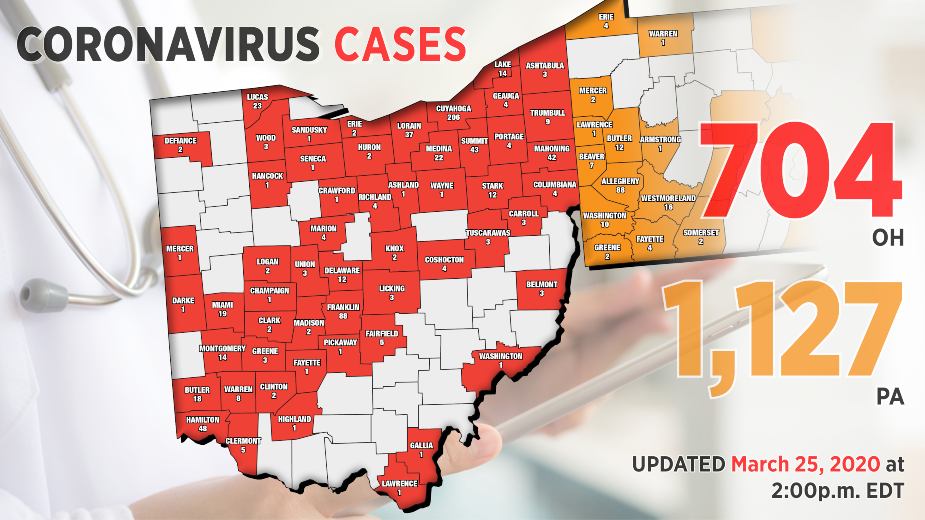COVID Surge May Lead to Challenging Ethical Decisions
COLUMBUS, Ohio — As Ohio braces for a projected surge in coronavirus cases, state officials say allocation plans for limited health resources may lead to possible extraordinary decisions of who will and won’t receive life-sustaining treatment.
Gov. Mike DeWine was asked if Ohio could find itself in a similar situation as Italy, a country overrun by COVID-19 cases. The country faces the decision of prioritizing treatment for patients who have outgrown the available staff, equipment and capacity availability.
“That’s what scares us. It’s one of the things we’re trying to prepare for, one of the reasons we’ve closed schools and did all these other things. And it still may happen. But we’re doing everything we can to avoid that,” DeWine said at his Wednesday news briefing. “That’s why we’re asking Ohioans to follow the orders, follow suggestions, and do everything they can so we can slow this thing down. We’ve got to slow it down. We can’t have it spike like that.”
Nodding her head in agreement was Ohio Department of Health Director Dr. Amy Acton, who said we have to learn from Italy.
“That’s one thing keeping me awake at night,” she said in response to the question. “That’s why every day and every person matters. You’ve got to stay at home and we’ve got to slow down and stop the spread.”
Acton reported the virus is responsible for 10 deaths. There are 704 confirmed cases in Ohio, including 116 health care workers. COVID-19 has hospitalized 182 people with 75 in intensive care.
As of 2 p.m. Wednesday, Mahoning County reported 42 cases, with nine in Trumbull County and four in Columbiana County.
Acton projects the peak of cases will hit late April, mid-May and that 40% to 70% of Ohioans will get the virus. Ohio faces a shortage of personal protective equipment, or PPE, and has been inventorying equipment like ventilators, which are used to push air into lungs of those with severe COVID-19 as it restricts a person’s ability to breathe.
She says hospitals have been able to convert some machines to be used as ventilators, while auto manufacturers and other U.S. companies are making plans to convert assembly lines to produce ventilators. Other researchers and companies are working on innovative ways to sterilize PPE to be reused in order to combat the shortage, she noted. Ohio also has had a shortage of tests and has conserved testing to the sickest patients already hospitalized, as well as health-care workers.
These are some of the reasons DeWine has taken strict measures, first closing down schools, followed by bars, restaurants and issued a stay-at-home order for Ohioans and companies who do not perform essential services.
As the outbreak curve continues on an upward slope, Acton said Centers for Disease Control and Prevention and the Institute of Medicine have published guidance on the ethical medical decisions.
According to the report, when there’s a severe shortage of life-saving medical resources, priority is given to those who are most likely to recover.
“In the world of health preparedness there is an ongoing dialogue about this. These are ethically difficult, difficult decisions. These conversations are being held collectively and we absolutely plan for every scenario. These conversations are happening, like I said, at the Institute of Medicine and the CDC. They’ve happened way before this pandemic and pandemic planning. They are conversations we have to have as a society and as a United States of America,” Acton said with emphasis on the word “united.”
Also Wednesday, Lt. Gov. Jon Husted said the unemployment online and phone system had been restored as of yesterday. He said that 400,000 calls came into the system Tuesday.
Husted says businesses in health care and food supply chains need more drivers to ensure packages are being delivered on time. The U.S. Department of Transportation announced some of the provisions for obtaining and renewing a commercial driver’s license are being lessened.
Husted was asked about clarifying what workers are considered essential under the order, and he again reiterated for companies to read the order. Husted says the order was based on guidelines set forth by Homeland Security. He urged people not to call 911, local health departments or the coronavirus hotline to ask for interpretation of the order, but to read it online.
He also says that businesses that are providing essential services still must provide a safe work environment.
“The safe work environments are going to be with us for a long time. Even when we can begin to come out of this, we are still going to need you to create these safe work environments,” Husted said.
DeWine says enforcement will be taken soon on companies that aren’t complying with the order.
Husted also announced that the Home Energy Assistance Program, or HEAP, winter utility assistance program normally runs through the end of March, but has been extended through May 1 for income eligible Ohioans.
Copyright 2024 The Business Journal, Youngstown, Ohio.



